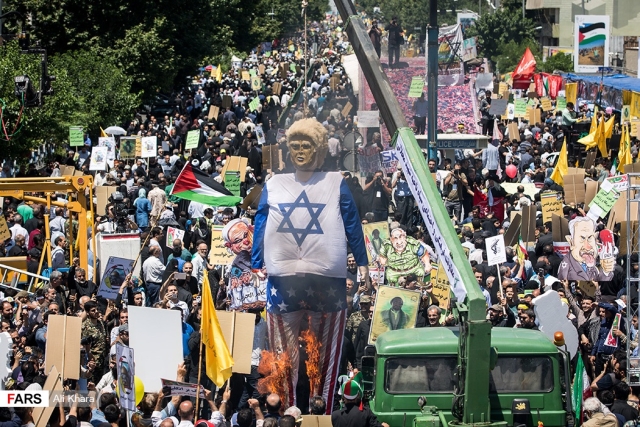In a recent grand military ceremony held at a military base in the western part of Iran, General Mohammad Bagari, the commander of the Iranian army, took the stage before thousands of soldiers assembled in formation. The ceremony, which drew considerable attention, featured both verbal and visual elements that sent a strong anti-Israel message. However, it was marred by a rather conspicuous flaw: a Hebrew message intended for Israeli viewers that suffered from linguistic inaccuracies.
This significant event, whose details have been brought to light by the MEMRI Institute, a renowned research body dedicated to shedding light on the inner workings of Israel's adversaries, unfolded just days ago.
As General Bagari addressed the crowd, passionate chants demanding the obliteration of Israel resonated through the air. On the floor of the venue, inscriptions in both Persian and Hebrew were prominently displayed. The Hebrew inscription, however, bore a message that revealed a clear lack of proficiency in the Hebrew language. It read, "Israel should be erased from above," a phrase that undoubtedly left Hebrew speakers puzzled.
Iranian Armed Forces Chief of Staff Gen. Mohammad Bagheri Delivers Speech While Soldiers Stand in Formation Over a Surface Emblazoned with the Inscription: “Israel Should Be Erased” #Iran #IRGC #JCPOA pic.twitter.com/vdQUvySEBS
— MEMRI (@MEMRIReports) September 28, 2023
Beyond this linguistic blunder, the ceremony featured a speech by General Bagari that was infused with religious symbolism. In his address, Bagari made reference to the concept of the "vanished imam," a central figure in Shia Islam whom believers anticipate will emerge one day to champion the cause of Shia Islam against Sunni Islam and, indeed, the entire world, including non-believers.
"The reign of our Lord and leader, the vanished Imam, is the reign of the righteous. But what is the meaning of waiting for his arrival? There is no meaning in waiting idly and merely professing love for the Imam. This waiting finds its significance in faith, in the actions of jihad, in ceaseless effort, in altruism, in self-sacrifice, and in readiness," General Bagari articulated to his attentive audience.
🔍 Iranian Plot Unmasked 🕵️♂️: Foiled Espionage, Arson, and Assassination Targeting Israeli Figures, such as @itamarbengvir and Yehuda Glick in Israel. Read the shocking details! #Iran #Espionage #IsraelSecurityhttps://t.co/qA6yiCCz8F
— The Judean (@TheJudean) September 28, 2023
He went on to elaborate on the nature of the impending battle in honor of the Imam, a battle anticipated to be fierce and waged against well-armed oppressors. "This battle will demand from us formidable and disciplined military forces, characterized by dedication, determination, and unwavering courage in the spirit of Jihad," Bagari asserted, leaving little doubt that the reference was directed at the ongoing tensions between Iran and Israel.
It's worth noting that while the Quran and other teachings of Shia Islam traditionally categorize the Jewish people as the "people of the book," viewing them as a people of Israel with an ethnic identity as opposed to purely a religious one, this ceremony seemed to frame them as a potential adversary.


